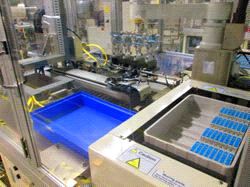Packaging
Epson Portland Promotes Reuse to Improve Quality and Reduce the Environmental Burden

Friday 23. August 2013 - While many technology companies outsource manufacturing, Epson has a longstanding commitment to monozukuri, which translates as the art and science of manufacturing. Epson strongly believes in creating from the ground-up products that it designed itself, and in refining the techniques and skills developed in manufacturing products to form the basis for the next generation of products. Although the idea of monozukuri developed in Japan, a strong commitment to continuously honing skills is present throughout the entire Epson Group worldwide.
Located in the Pacific Northwest of the United States, Epson Portland Inc. has been producing ink cartridges since 1999 and in that time has operated five different generations of ink cartridge assembly lines. Epson Portland has a strong belief in manufacturing quality products that exceed customer expectations, while maintaining a strong commitment to send no waste to landfills.
With this in mind, Epson Portland’s management and staff are determined to implement the philosophy of reduce, reuse, and recycle, even in manufacturing. In 2006 the company built an automated packing machine loader from equipment taken from retired ink cartridge assembly lines. Since then, Epson Portland has continued to reuse hardware and robots from retired lines in other parts of the plant, with the aim of increasing efficiency, quality and output at a minimal cost.
Epson Portland has also reused components from retired lines instead of sending them to a recycling center and buying new parts. For example, in the ink manufacturing area the company used retired programmable logic controllers (PLCs) to create a timer for ink barrel mixers with a light that goes on when the mixer stops. The result was an effective and low-cost way to improve accuracy and workflow.
In the cleanroom, Epson Portland reused machine parts and cells to fully automate five used semi-automated ink cartridge production lines transferred from another factory. The cost to complete this automation was reduced by reusing machine parts from retired assembly lines. Automating the semi-auto assembly lines reduced handling errors and defects, and improved consistency, quality, and machine output.
In the vacuum packing area, Epson Portland was able to use robots from the oldest generation of retired lines to automatically unload cartridges from vacuum packing machines. This reduced damage, increased count accuracy, and standardized the way in which each cartridge was handled. A QR code reader was also installed on five of the vacuum packing machines. These readers automatically scan ink cartridges as they pass by on the conveyor belt to prevent incorrect models from accidentally being shipped to customers. In the past, the process relied on a visual check, and the new development turned out to be a time saving improvement that prevents human error and increases customer satisfaction.
“Epson’s commitment to monozukuri provides us with endless opportunities to innovate and improve,” said Dave Graham, president of Epson Portland Inc. “Reusing retired machinery is a form of innovation that has helped us to boost product quality, improve efficiency and reduce the burden on the environment.”
